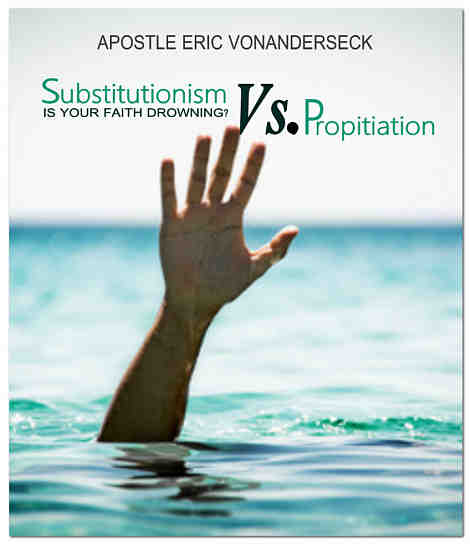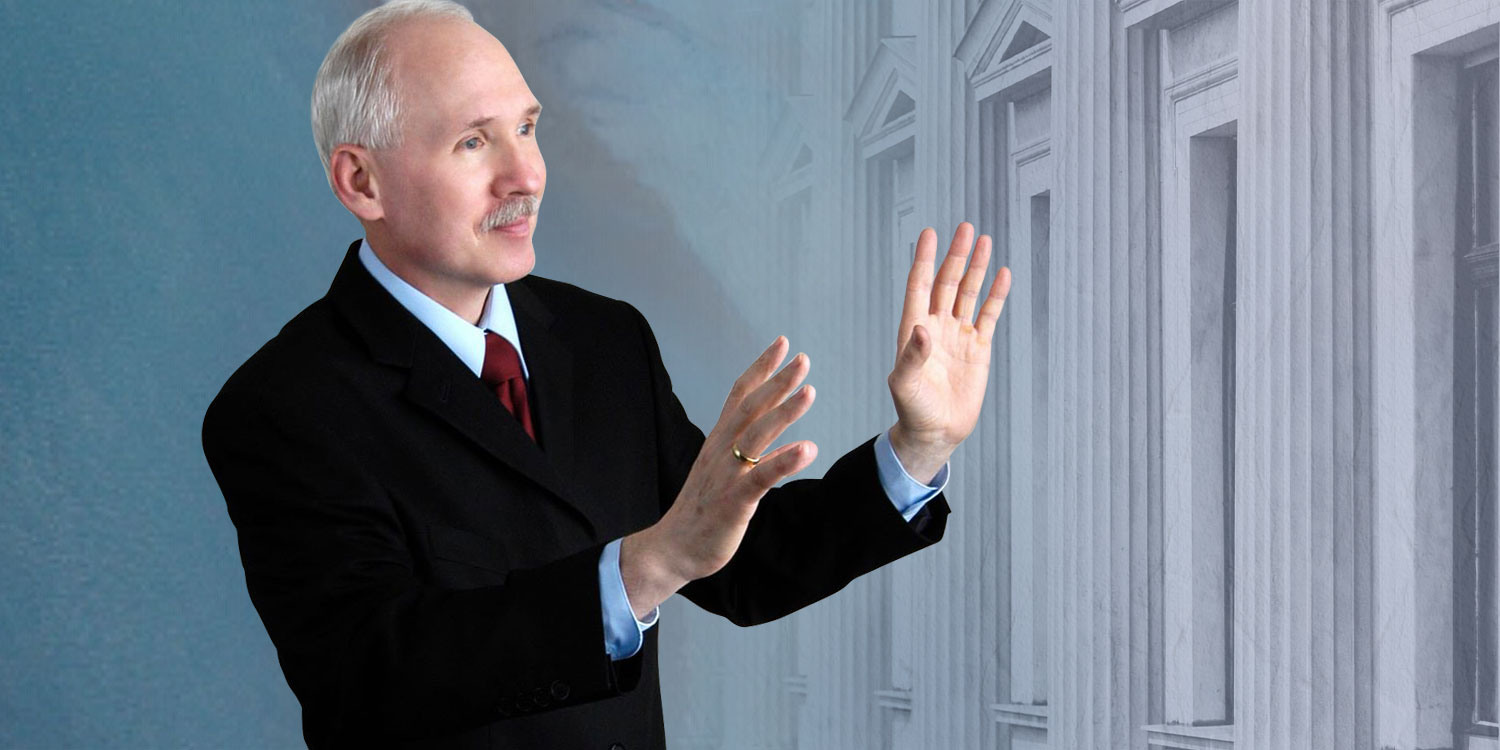
Author:
Apostle Eric vonAnderseck
Eric serves as a called and confirmed Chief Apostle in the restored government of God. He is the founder of s8w Ministries, and it is through his stewardship that God ushered in a new season of restoration for all believers who desire to walk in the fulness of Christ. View my profile.
God restored the church to the covenant of Jesus Christ and once again Jesus is correctly taught to be the propitiation for our sins rather than our substitute. To many believers, these are one and the same, when in reality they are on opposite sides of the ring.

Why do Christians, who are otherwise rational and intelligent, teach that Jesus is our substitute? The truth of the matter is that they don’t know any better.
The “substitutionism mindset” ruled the church when the covenant of Jesus Christ was no longer taught. Substitutionism is a doctrine of convenience.It feels good to have Jesus take our place and to think that Jesus gave us His place… but it isn’t God.
When you hear justification explained as, “I believe in Jesus and it’s just as if I’d never sinned” and righteousness explained as a summary trade, “Jesus took my sins and I took His righteousness”, you know something is desperately wrong.
What’s wrong is the doctrine of substitutionism. On the surface, there doesn’t appear to be anything wrong with the idea of Jesus being our substitute. But the undertow of the flesh will pull you down into troubling waters. Your faith is drowning and you need someone to throw you a life line.
The idea that Jesus as our substitute, once introduced to the church, spread like wild fire through every Christian denomination until it was assumed to be true and no longer questioned. So, what’s substitutionism and how does it differ from the true gospel of Jesus Christ?
In this study, we’re going to look at these two opposing views: Christians either believe that Jesus was their substitute, or they believe that Jesus is the propitiation for sins. Both doctrines are based on the fact that Jesus died for us. But, there are two very different ways to understand the little word “for” that is causing all this confusion.
When under the spell of substitutionism, the covenant of Jesus Christ is set aside for a summary trade. In the house of God building takes place by contact with God through Jesus Christ for the bond of faith to find completion in Him. Just as substitutionism is not propitiation, trading places is not the same as sanctified contact. Don’t settle for “trading places with Jesus” when you can experience Him through contact.
Substitutionism does not allow for the contact according to the provisions of the covenant and so the soul does not experience increase. A person wants to take Jesus’ place (this works well with one’s imagination) rather than labor with His grace. That’s just not how God works.
Substitutionism OR Propitiation: Which One is God’s plan?
There are two opposing views in regards to the redemption of mankind. Christians either believe that Jesus is their substitute, or that Jesus is the propitiation for sins. These are not two sides of the same coin, they are diabolically opposed.
Both doctrines are based on the fact that Jesus died for us, but the word “for” takes on a different meaning in propitiation than it does when talking about Jesus being our substitute.
Jesus our substitute: The belief is that Jesus died for us, meaning in our place.
Jesus our propitiation: The belief is that Jesus died for us, meaning for our benefit as our advocate.
The Apostle John preached the doctrine of propitiation, that Jesus died for our benefit.
1 John 2:1,2
My little children, these things write I unto you, that ye sin not. And if any man sin, we have an advocate with the Father, Jesus Christ the righteous:
2 And he is the propitiation for our sins: and not for ours only, but also for the sins of the whole world.
The Apostle John set the propitiation of Jesus Christ in connection to His advocacy. Jesus shed His blood to provide the terms of the covenant which allows Him to mediate the covenant as our advocate. God’s provision for us is by covenant. God set His standard, requirements, and expectations for our faith in Jesus Christ, that by contact with Him our faith would reflect and express Him.
The False Religious System preaches the gospel of substitutionism. Under the guise of substitutionism, believers are led to believe that Jesus died for them meaning, in their place. The idea that Jesus is our substitute creates the concept that Jesus took our place and that God initiated a trade. On the basis of this trade, a person believes that Jesus took our sins and we took Jesus’ righteousness. We become what He is without covenant contact – without faith becoming active with the tools God sprinkled with the blood of Jesus.
Substitutionism is a bloodless faith – it is a convenantless faith. The word “substitute” is not found in the original King James Bible.
The False Doctrine of Substitutionism is Based on a Summary Trade
The false doctrine of a substitutionary work claims that Jesus became literal sin so that God can punish Jesus instead of punishing us. It is therefore preached that Jesus also went into the flames of hell in our place until God’s justice was satisfied and He cried, “Enough!” And then Jesus is said to have snatched the keys out of the hands of the devil for our release. This makes for good drama and this is in part why it has been accepted for so long—it satisfies the imagination, but it’s not the gospel of Jesus Christ.
Jesus is our righteousness. But did He have to become sin to make us righteous? No, He only had to shed His blood and die on the cross and rise from the dead for our benefit. Through His blood, Jesus provided the terms of the covenant for our acceptable contact with God. God set the standard for faith to reflect Him; this is why Jesus is our righteousness. God did not initiate a trade—He initiated contact!
Let’s examine the substitutionary trade to see what God is getting in return. In this trade Jesus is said to take our place so we can take His place. The problem is that there is nothing of man that God wants or needs. God did not need man’s sin in order to create righteousness.
This unequal yoke (trade) summarily dismisses the terms of the covenant on which God bases His expectations and requirements for faith to reflect and express Jesus Christ.
Under the heavy yoke of a substitutionary trade the natural man is seen to initiate towards God what he believes God desires (faith, love, joy, peace, contrition, forgiveness). The natural man approaches God on the conditions of his own needs, wants, desires, regrets, political climate, current threats, and lack; in other words, the themes and issues of life – Themistic Law – which is worked out through the law of one’s own principle.
The carnal mind, using substitutionism as leverage, believes that God is waiting for us to act so He can act. If you desire healing and miracles and financial increase (approaching God on the basis of need/Themistic Law) you state what you believe the scriptures say about these desires. Do you see how the natural man wants God to reciprocate on the level of the flesh?
A person can say many factual things about Jesus (what the Bible states), but not the function of Jesus (how Jesus is expressed through covenant tools and contact) so a relationship with God is based on what you want to initiate: pageantry, music, healing lines, anointing oil to get God involved with their life (needs).
These are all tokens of substitutionism. It is lifeless legalism in that it stands in one’s principle. As you stand in this perspective to gain the consent of the Lord (you want God to consent to this), you’re loving God with these tokens you’ve selected so that God will reciprocate in kind to you and fulfill your desires. That’s legalism. When you talk about legalism, you’re talking about human principles working through substitutionism.
God’s plan is that we love Him because He FIRST loved us. This means that we reciprocate based on what He first gave us. I John 4:19, “We love him, because he first loved us.”
What’s the opposite? God loves us because we first loved Him. This is faith initiating towards God on the conditions of the flesh; this is the unconditional love that is put under the guise of grace: God loves me as I am, meaning I’m stepping forward “God, here I am!” But God says, “I didn’t ask you to do that.”
The substitutionary trade removes the fear of God by stepping forward to play the part of the unworthy servant. A person is taught to say, “Lord I are unworthy, but this is what I’ll do” and they go through a list of commitments and mental flagellations to appease their conscience.
When Jesus is understood as our propitiation, setting the terms of contact in Himself, we learn to depend upon His love and gifts to multiply His grace and increase in His fruits as He cleanses the conscience by establishing His virtues as the power and throne of the will.
Now we understand why a substitutionary trade is such a heavy yoke. Your faith is made to labor with Themistic Law to see yourself in a better place, under better circumstances, doing better, being better.
Substitutionism is further seen as a heavy yoke in that your soul is not increasing with the fruit of Christ (as it would under the propitiation of Jesus Christ) so increase has to be initiated by the natural man who looks within himself for the raw material to increase. While he says he is doing it for God, he’s actually consenting to his principle as the virtue and throne of the will.
Propitiation is quite different. Under the easy yoke of propitiation, the spiritual man is seen to accept the knowledge and tools God initiated for faith to engage God on His level.
A substitutionary trade is the divine exchange gone wrong – it is the counterfeit. Reciprocation is taking place on the level of the flesh.
When foolishly accepting a substitutionary trade, Christians are ignorantly accepting the paradoxes that go with it. Let me explain what a paradox is. We know, for example, that sanctification and holiness are words in the Bible and that these words are important to God and play an important role of living out a Christian life, yet because faith is focused on substitutionism (the counterfeit trade) a person is not schooled in the true faith and covenant terms, and does not know Gods requirements for sanctification and holiness to become a reality.
How do we know this to be true? Look at all the how-to books peddled by Christian authors: how to make faith living, how to make worship meaningful, how to relate to God as a father, mentor, brother, etc. The trade does not create the reality of Christ and so one is forced to keep looking for it. Truth in the current Christian culture has always held a familiar “are we there yet?” feel to it.
Sanctification and holiness became ideals to strive after rather than a reality abided in; they were presented as a level of maturity and fullness that is always out of reach while one is honored for the pursuit of something noble. This double standard (saying one is serving God while at the same time working faith from the natural man) and confusing paradoxical outcomes are the trace evidence of the heavy yoke found in substitutionism.
Let’s recap: Jesus, fulfilling the scriptures, bore our infirmities but did the Lord become that which offended His Holiness? In resisting the devil did the Lord of Hosts finally capitulate to Satan’s wiles? Substitutionism seeks to grasp the promise of good will and at the same time deny the source.
This clever paradox keeps the soul in the journey seeking holiness while keeping holiness itself out of arms reach; while Jesus’ propitiation for us puts holiness in the works of faith which requires the tether of grace for holiness to be a present experience.
“My little children, let us not love in word, neither in tongue; but in deed and in truth.” (1 John 3:18) To love God in word means to quote what the Bible says about sanctification, holiness, grace, truth, regeneration, charity (the elements of the gospel), but not connect them to the covenant where they are lived out by the deeds of the covenant—contact with Jesus to experience the divine reciprocation.
When the Spirit of God, through Apostle John, bears out that for some loving God is in word only, the Holy Spirit is pointing to the natural man working with the devil’s triad to take ownership of the elements of the gospel to play them out through one’s aspiration, principle, and imagination.
Focus Creates Value
Focus creates value. The focus of Jesus as our substitute created a gospel in which Christ is not valued, nor are any of the terms of the new covenant valued; therefore Jesus cannot advocate the terms God set for contact.
Missing that much needed contact, reciprocation, living witness in the anointing, healing of the soul and fruit bearing, a Christians sets out on a journey to get these things. This sad state of affairs (faith being separated from Christ) was not identified as being a bad thing because it was justified by saying, “We’re just trying to get closer to Jesus”.
This language “getting closer” is yet another tell tale sign of the typical void that is experienced on account of the doctrine of substitutionism.





